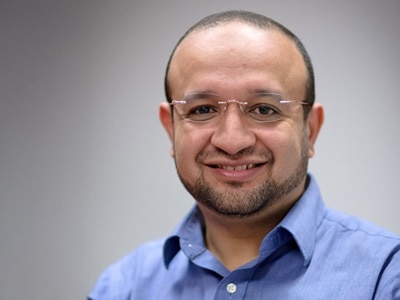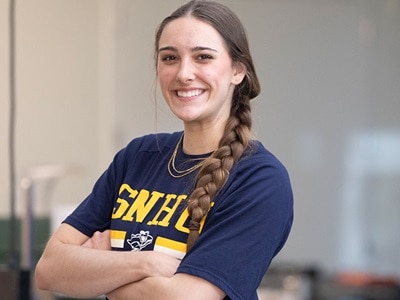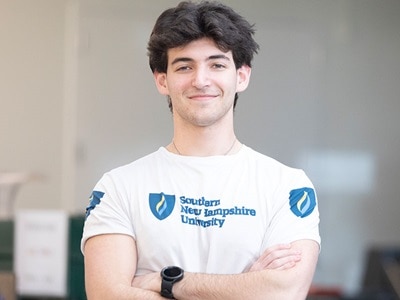Bachelor of Science in Mechanical Engineering New England campus experience
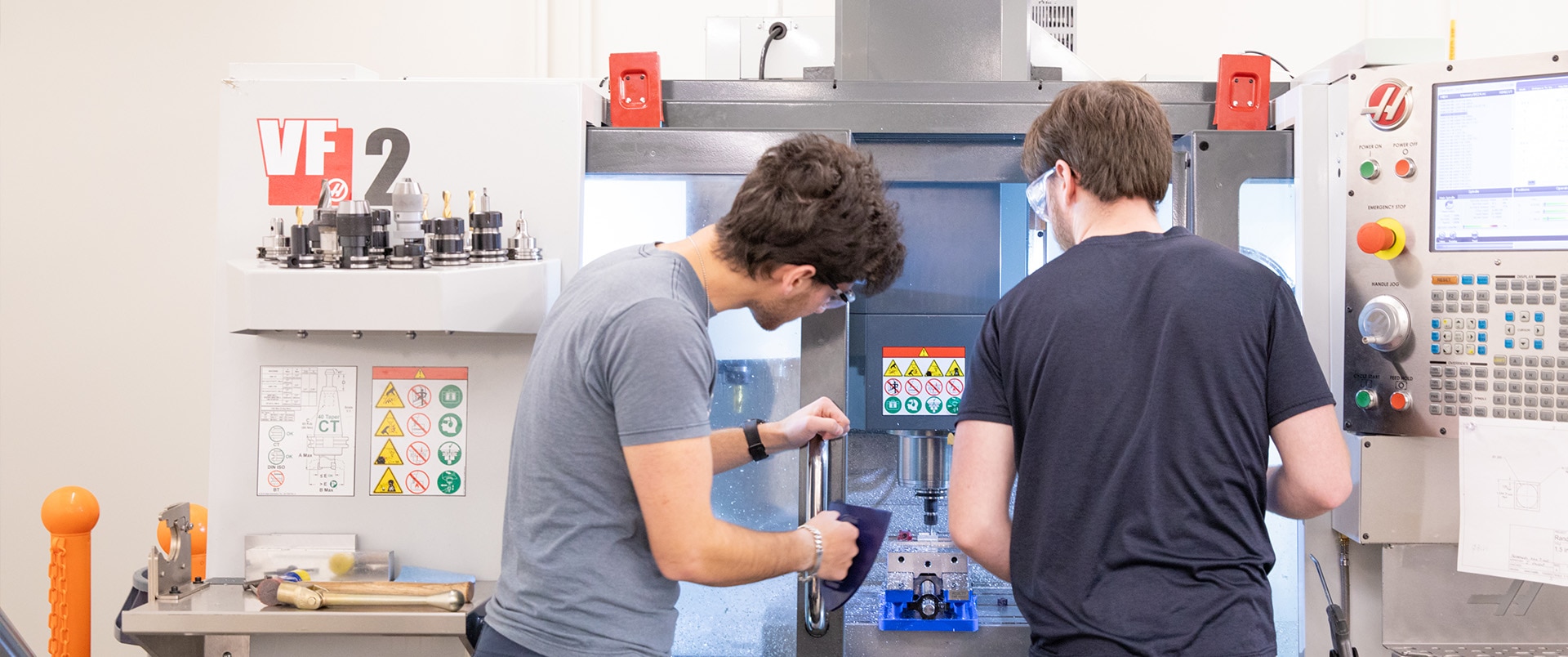
Program Overview Why get a mechanical engineering degree on campus?
Prepare yourself for a future engineering career with a Bachelor of Science (BS) in Mechanical Engineering from Southern New Hampshire University. As a discipline that offers a wide range of opportunities, SNHU's on-campus mechanical engineering program will help ensure you gain the design, analysis, development and manufacturing knowledge that you need to succeed in a mechanical engineering position.
In this ABET-accredited program, you'll focus on mechanical systems and be prepared to enter the engineering field in the areas of advanced materials, robotics, thermal-fluid systems, power and energy systems, propulsion systems, manufacturing and more.
Skills you'll learn:
- Engineering design principles
- Leadership skills
- Solving complex problems
- Mechanical systems
- Technical solutions
- Meeting objectives
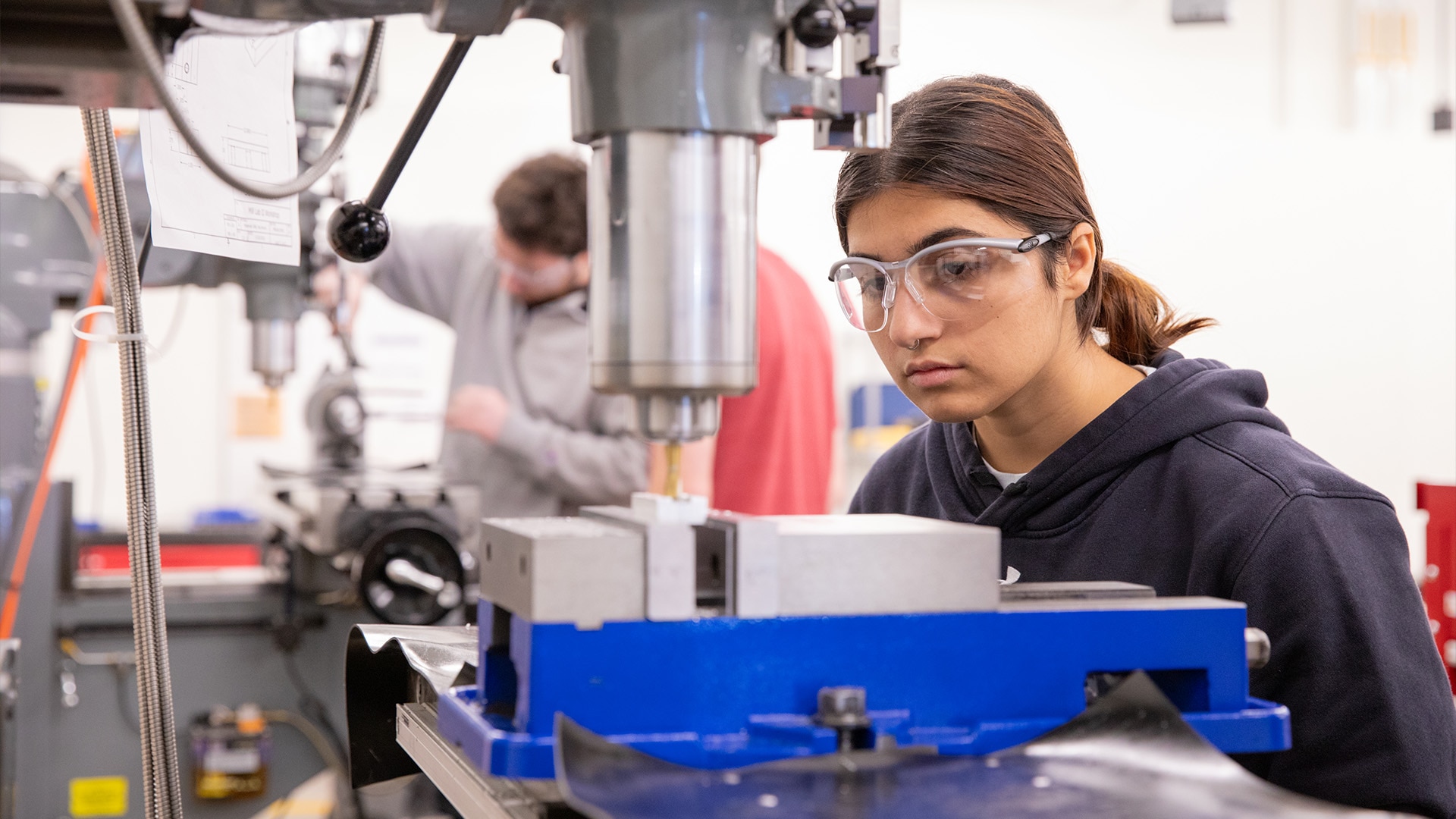
Courses & Curriculum Design the future with on-campus mechanical engineering courses
Based on the international CDIO (conceiving, designing, implementing and operating) initiative, the SNHU on-campus mechanical engineering program consists of degree-specific courses and general education courses that will help you identify, formulate and solve complex engineering problems by applying principles of engineering, science and mathematics. Here, you'll achieve a good balance of project-based learning, hands-on learning and traditional, theory-based engineering education.
Learn from instructors with industry experience
Our faculty bring with them decades of knowledge and experience in mechanical engineering, which informs the development of SNHU's courses and curriculum. They look forward to supporting your journey both in the classroom and as you work toward a career in your field.
Ahmed Ali
Position
Assistant Professor, Mechanical Engineering
Joined SNHU
2023
Education
- PhD in Computational Fluid Dynamics (CFD) of Combustion from Loughborough University, UK
- BS in Mechanical Engineering from Cairo University, Egypt
Dr. Ahmed Ali's academic experience includes teaching, research and development and supervision of curriculum design and delivery. He has more than a decade of academic experience, having held a faculty position at Petronas University of Technology (UTP) in Malaysia and a visiting faculty member position at the University of British Columbia (UBC) in Canada. Ahmed carried out research in thermo-fluids and taught a number of fundamental and specialized courses in engineering, business and data science. He supervised doctoral and master's students through completion of their programs, as well as graduation projects. He has published and presented more than 20 papers in reputable journals and international conferences and has more than a decade of industrial experience as a practicing licensed professional engineer. He worked in senior engineering roles in the oil and gas and power generation industries and is also a data science consultant, developing machine learning models for various businesses and industries.
Jennifer McInnis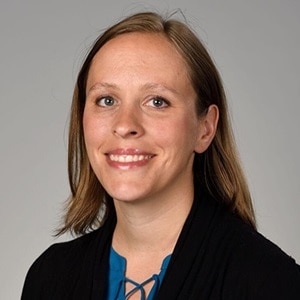
Position
Department Chair (Engineering), Associate Professor (Mechanical Engineering)
Joined SNHU
2017
Education
- MS in Mechanical Engineering from Worcester Polytechnic Institute
- BS in Aeronautical Engineering from Daniel Webster College
Before joining SNHU, Jennifer McInnis taught at Daniel Webster College from 2014 to 2016. She also enjoyed a previous stint with Daniel Webster as an engineering project lead and several years as a teaching assistant with Worcester Polytechnic Institute. McInnis also has a strong track record within the engineering industry, having spent time as a manufacturing engineering technician with UltraSource, Inc. She is currently working toward a PhD in Mechanical Engineering, as well. She is a member of the American Society of Engineering Educators and the Society of Women Engineers.
To learn more about SNHU faculty, visit our campus faculty page.
Program Educational Objectives
The BS in Mechanical Engineering program is preparing graduates to:
- Pursue professional careers in mechanical engineering or other disciplines using the knowledge and problem-solving skills they developed
- Increase responsibility in technical and/or management areas
- Be recognized from their managers and peers as effective and valued members of their work team
- Increase discernment and sensitivity in the consideration of global and societal contexts and consequences when making engineering decisions
- Expand their professional, personal and interpersonal skills and engagement in lifelong learning activities, including post-graduate education for some graduates
- Become involved with professional and other service activities that contribute to industry and society
Program Outcomes
Upon completion of this program, you'll be expected to know and be able to:
- Identify, formulate and solve complex engineering problems by applying principles of engineering, science and mathematics
- Apply engineering design to produce solutions that meet specified needs with consideration of public health, safety and welfare, as well as global, cultural, social, environmental and economic factors
- Communicate effectively with a range of audiences
- Recognize ethical and professional responsibilities in engineering situations and make informed judgments that must consider the impact of engineering solutions in global, economic, environmental and social contexts
- Function effectively on a team whose members provide leadership, create a collaborative and inclusive environment, establish goals, plan tasks and meet objectives
- Develop and conduct appropriate experimentation, analyze and interpret data and use engineering judgment to draw conclusions
- Acquire and apply new knowledge as needed, using appropriate learning strategies
Campus major courses
You’ll take major courses that provide you with a solid foundation in your area of study – in some cases featuring experiential or project-based learning opportunities, labs, simulations and internships. These courses will allow you to learn a wide variety of topics and help prepare you for a role in your desired field.
Courses may include:
Visit the course catalog to view the full BS in Mechanical Engineering curriculum.
Campus general education courses
All undergraduate students are required to take general education courses, which are part of SNHU's newly redesigned program, The Commons. The goal of The Commons' curriculum is to empower you with some of the most in-demand skills, so you can succeed not only in your academic career, but in your personal and professional life too.
Courses may include:
Can’t wait? You don’t have to!
Apply now if you’re ready, and have your decision within 30 days. Or, schedule a visit and come see us in person!
Have questions? Visit our Contact Us page.
Career Outlook What can I do with a mechanical engineering degree?
From research and development to manufacturing, mechanical engineers are best known for working on a wide range of projects, such as designing machines from engines and heating, ventilation and air conditioning (HVAC) systems to elevators and escalators. In other words, they're responsible for designing, building and implementing many of the devices we use in our daily lives. As a mechanical engineer, you could carve a career path in the automotive industry, the biomedical field, construction or even robotics.
Career paths include:
- Heating and cooling systems engineer
- Automotive engineer
- Structural engineer
- Mechanical designer
Yearly projected job openings on average for mechanical engineers through 2033, according to the U.S. Bureau of Labor Statistics.1
Median annual wage nationally for mechanical engineering occupations as of May 2023, according to BLS.1 Statistic not based on wage data for SNHU graduates.
Understanding the numbers
When reviewing job growth and salary information, it’s important to remember that actual numbers can vary due to many different factors—like years of experience in the role, industry of employment, geographic location, worker skill and economic conditions. Cited projections are based on Bureau of Labor Statistics data, not on SNHU graduate outcomes, and do not guarantee actual salary or job growth.
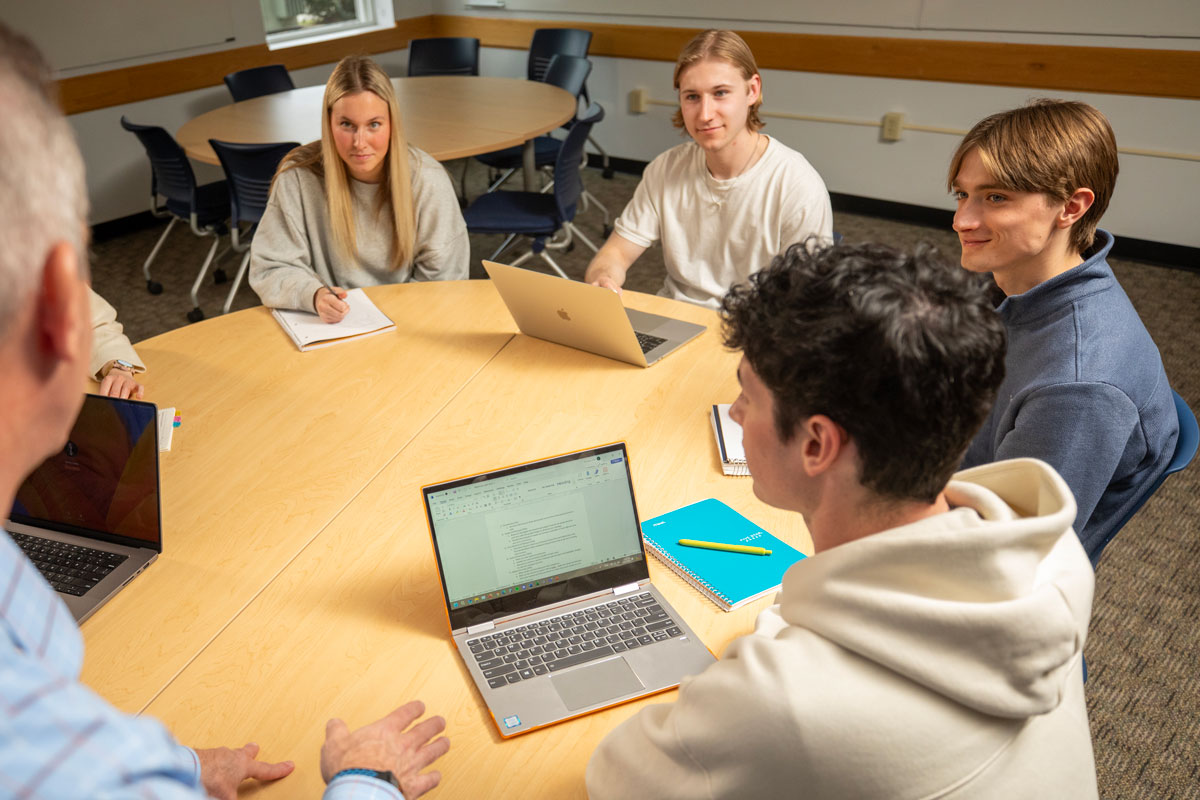
Campus Student Experience So, what's it like taking classes on campus?
At SNHU, the mechanical engineering program is extremely hands on. SNHU embraces a multidisciplinary approach to education, so whether you're collaborating with students in other disciplines in the classroom - such as aeronautical engineering or electrical and computer engineering - or solving complex problems and designing solutions for local community partners through your internship, you'll be putting engineering theory into practice every day here on campus.
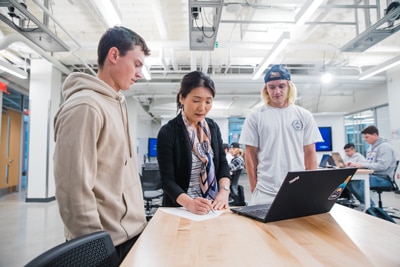
Student support
At SNHU, you don’t have to do this college thing alone. You’ll have help from your advisor, access to tutoring and office hours, career coaching, and mental health services so you can do your best and feel your best.
Additionally, our Office of Diversity and Campus Accessibility Center make campus a safe place for everyone. Visit our Student Services page to learn more about our support offerings.

Small class sizes
With an average class size of 15-25 (depending on your major) you’ll learn in an environment where professors with real world experience know you by name.
Here, you’re not getting lost in giant lecture halls, but instead, actively participating in thoughtful dialogue where you’re always encouraged to collaborate with your peers and ask questions when they arise.
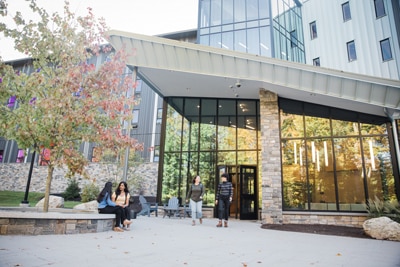
State-of-the-art facilities
Our 300-acre campus has everything you need. From technology-advanced classroom settings to your dorms complete with fitness centers and hangout spots, our goal is to give you the best college experience possible.
Whether you’re learning in a classroom, in a lab, on the field, or in your field, you’ll have what you need to be successful from the moment you wake up to the moment you close your textbooks.
School of Engineering, Technology and Aeronautics Learn about the School of Engineering, Technology and Aeronautics
In the School of Engineering Technology and Aeronautics, you'll put theory into practice daily. From circuit projects to flight test classes, you'll collaborate with peers, faculty and the community to take on real-world challenges. With a drone-flying arena, unmanned aerial vehicle prep space, wood shop, robotics lab and more, you'll have all the tools at hand to bring your ideas off the page.
How SNHU makes college affordable
At Southern New Hampshire University, we're on a mission to make high-quality education more accessible with more affordable tuition. With 70+ career-focused majors, state-of-the-art facilities, D2 sports and over 70 student clubs and organizations, you can get the campus experience you've always dreamed of at a more affordable price.
Fill out the FAFSA to see if you’re eligible for grants or work-study. (You could also be offered loans, though you’ll have to pay those back later.)
Transfer up to 90 credits toward your bachelor's degree program at SNHU. If you’ve taken one course or many, we’ll evaluate them for you.
Getting free money for college – from SNHU or an outside organization – could help you save hundreds or even thousands of dollars.
Our collaborative partnerships with high schools enhance academic opportunities and college accessibility for some high school students.
Hear from us
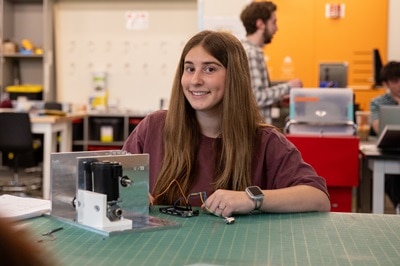
Sydney Roubain, engineering major
Accreditations
SNHU is accredited by the regional accreditor the New England Commission of Higher Education (NECHE). The university also carries specialized accreditations for some programs.

This program is accredited by the Engineering Accreditation Commission of ABET, under the commission’s General Criteria and Program Criteria for Mechanical and Similarly Named Engineering Programs. Student and graduate data can be found below:

Program Enrollments (Fall 2024)
Mechanical Engineering (BS): 109
Graduates (Academic Year 2023-2024)
Mechanical Engineering (BS): 21
Sources & Citations
1Bureau of Labor Statistics, U.S. Department of Labor, Occupational Outlook Handbook, on the internet, at https://www.bls.gov/ooh/architecture-and-engineering/mechanical-engineers.htm (viewed Oct. 3, 2024). Cited projections may not reflect local or short-term economic or job conditions and do not guarantee actual job growth.
Your dream school is waiting
Apply now or schedule a visit today.



